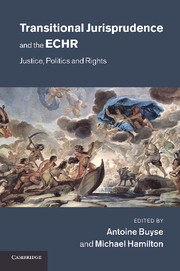Book contents
- Frontmatter
- Contents
- Foreword
- Acknowledgements
- 1 Introduction
- 2 Transitional emergency jurisprudence
- 3 Rights and victims, martyrs and memories
- 4 Confronting the consequences of authoritarianism and conflict
- 5 Freedom of religion and democratic transition
- 6 The truth, the past and the present
- 7 Transition, political loyalties and the order of the state
- 8 Transition, equality and non-discrimination
- 9 Closing the door on restitution
- 10 The Inter-American human rights system and transitional processes
- 11 The ???transitional??? jurisprudence of the African Commission on Human and Peoples??? Rights
- 12 Conclusions
- Index
- References
1 - Introduction
Published online by Cambridge University Press: 07 September 2011
- Frontmatter
- Contents
- Foreword
- Acknowledgements
- 1 Introduction
- 2 Transitional emergency jurisprudence
- 3 Rights and victims, martyrs and memories
- 4 Confronting the consequences of authoritarianism and conflict
- 5 Freedom of religion and democratic transition
- 6 The truth, the past and the present
- 7 Transition, political loyalties and the order of the state
- 8 Transition, equality and non-discrimination
- 9 Closing the door on restitution
- 10 The Inter-American human rights system and transitional processes
- 11 The ???transitional??? jurisprudence of the African Commission on Human and Peoples??? Rights
- 12 Conclusions
- Index
- References
Summary
This book is concerned with the role and contribution of the permanent regional judicial mechanisms – in Europe, Africa and the Americas – to improving human rights compliance in societies emerging from conflict or authoritarian rule. Many studies have contrasted the approaches of constitutional courts in such settings, or the ad hoc and sometimes quasi-judicial mechanisms instituted to navigate transitional obstacles. With few exceptions, however, there has so far been little recognition that the jurisprudence of these regional institutions is profoundly shaping and enriching the law of transitional justice. As critical sites of transitional normativity, the case law of the regional commissions and courts – particularly the European Court of Human Rights – deserves close attention.
- Type
- Chapter
- Information
- Transitional Jurisprudence and the ECHRJustice, Politics and Rights, pp. 1 - 23Publisher: Cambridge University PressPrint publication year: 2011

